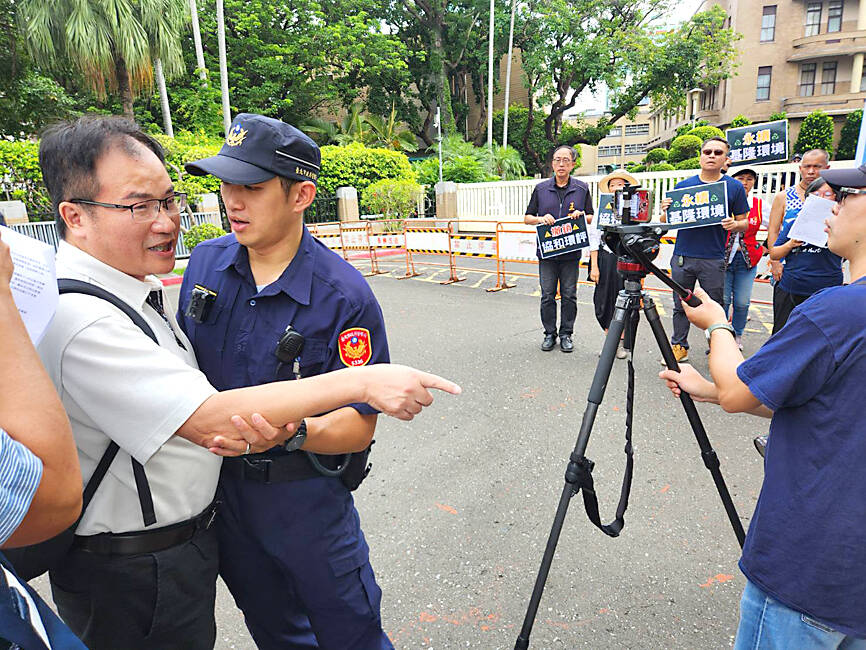Environmental groups yesterday filed an appeal with the Executive Yuan, seeking to revoke the environmental impact assessment (EIA) conditionally approved in February for the Hsieh-ho Power Plant’s planned fourth liquefied natural gas (LNG) receiving station off the coast of Keelung.
The appeal was filed jointly by the Protect Waimushan Seashore Action Group, the Wild at Heart Legal Defense Association and the Keelung City Taiwan Head Cultural Association, which together held a news conference outside the Executive Yuan in Taipei.
Explaining the reasons for the appeal, Wang Hsing-chih (王醒之) of the Protect Waimushan Seashore Action Group said that the EIA failed to address issues including soil pollution, environmental damage and national defense concerns.

Photo: Hsieh Chun-lin, Taipei Times
Wang added that the project site borders the Weihai Naval Base and claimed that Chinese military drills have used LNG receiving stations as simulated targets.
He said the EIA review process did not include any discussion of the national security issues.
Wild at Heart Legal Defense Association executive director Chen Hsien-cheng (陳憲政) said there were clear procedural flaws in the approval process, including the failure to release the sixth draft of the EIA report seven days ahead of the review meeting as required.
Chen also said that the assessment lacked substantive discussion of soil pollution and that the coral identification data contained numerous errors.
Tsai Ya-ying (蔡雅瀅), a lawyer with the association, said that a landfill location was approved without obtaining written consent from the Keelung City Government and without holding a new scope-defining meeting.
Tsai accused Taiwan Power Co (Taipower), the state-run utility responsible for the project, of releasing a misleading advertisement that claimed the terminal would emit no sulfur oxide.
The Hsieh-ho Power Plant currently has two oil-fired units each capable of producing 500 megawatts that began operating in 1980 and 1985, according to Taipower’s Web site.
The fourth LNG receiving station at the power plant had been under second-phase review since 2018 and underwent six preliminary review meetings before February’s decision to conditionally approve the project.
The EIA committee only gave conditional approval with the requirement that Taipower address soil contamination concerns.

The Coast Guard Administration (CGA) yesterday said it had deployed patrol vessels to expel a China Coast Guard ship and a Chinese fishing boat near Pratas Island (Dongsha Island, 東沙群島) in the South China Sea. The China Coast Guard vessel was 28 nautical miles (52km) northeast of Pratas at 6:15am on Thursday, approaching the island’s restricted waters, which extend 24 nautical miles from its shoreline, the CGA’s Dongsha-Nansha Branch said in a statement. The Tainan, a 2,000-tonne cutter, was deployed by the CGA to shadow the Chinese ship, which left the area at 2:39pm on Friday, the statement said. At 6:31pm on Friday,

The Chinese People’s Liberation Army Navy’s (PLAN) third aircraft carrier, the Fujian, would pose a steep challenge to Taiwan’s ability to defend itself against a full-scale invasion, a defense expert said yesterday. Institute of National Defense and Security Research analyst Chieh Chung (揭仲) made the comment hours after the PLAN confirmed the carrier recently passed through the Taiwan Strait to conduct “scientific research tests and training missions” in the South China Sea. China has two carriers in operation — the Liaoning and the Shandong — with the Fujian undergoing sea trials. Although the PLAN needs time to train the Fujian’s air wing and

The American Institute in Taiwan (AIT) put Taiwan in danger, Ma Ying-jeou Foundation director Hsiao Hsu-tsen (蕭旭岑) said yesterday, hours after the de facto US embassy said that Beijing had misinterpreted World War II-era documents to isolate Taiwan. The AIT’s comments harmed the Republic of China’s (ROC) national interests and contradicted a part of the “six assurances” stipulating that the US would not change its official position on Taiwan’s sovereignty, Hsiao said. The “six assurances,” which were given by then-US president Ronald Reagan to Taiwan in 1982, say that Washington would not set a date for ending arm sales to Taiwan, consult

A Taiwanese academic yesterday said that Chinese Ambassador to Denmark Wang Xuefeng (王雪峰) disrespected Denmark and Japan when he earlier this year allegedly asked Japan’s embassy to make Taiwan’s representatives leave an event in Copenhagen. The Danish-language Berlingske on Sunday reported the incident in an article with the headline “The emperor’s birthday ended in drama in Copenhagen: More conflict may be on the way between Denmark and China.” It said that on Feb. 26, the Japanese embassy in Denmark held an event for Japanese Emperor Naruhito’s birthday, with about 200 guests in attendance, including representatives from Taiwan. After addressing the Japanese hosts, Wang